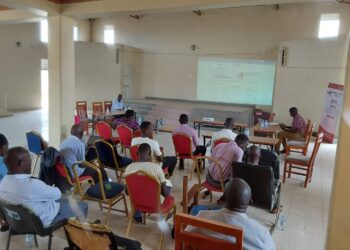In the current digital era, where data is essential to both communication and commerce, safeguarding people’s privacy has become a top priority. In this context, Unwanted Witness’s Privacy Scorecard Report for 2023 provides an in-depth analysis of data collection firms’ compliance with privacy regulations.
In order to protect people’s rights in the digital domain, the report highlights the critical need for enhanced compliance procedures by shedding light on the continuous difficulties and shortfalls in maintaining strong privacy standards.
While speaking during the unveiling of the report on Thursday at Hotel Africana, Allan Ssempala, the head of Legal at Unwanted Witness Uganda, noted that unlike the previous two editions, the report that was first unveiled at the 5th Privacy Symposium Africa in Mauritius, assessed a total of 48 data collectors drawn from four countries-Mauritius, Zimbabwe, Kenya and Uganda across six sectors namely: telecommunications, financial Services, online betting, digital loans services, e- commerce and e-government services.
In the report, significant discoveries reveal persistent hurdles, as general compliance continues to fall short of the 50 per cent mark in all three evaluations – registering at 35 per cent (2021), 45.5 per cent (2022), and 47.3 per cent (2023). While enhancements in aspects such as transparent policies and informed consent have been observed, the evaluations bring to light disconcerting disparities and insufficient adherence in the realms of data collection and third-party data transfers.
“We had different sectors, and in today’s findings certainly the performances of the companies have fallen below that average to the extent that the best scored 47.3 percent. While we disseminated this today is to ensure that at least these people improve their practices we have increasingly noted that many of these companies are having privacy policies to only shield them from liability not to guard the privacy of the people using their services,” he said.
He noted that the report assessed privacy policies that were available on the companies’ websites therefore any privacy policy that was not displayed on the company’s website however laudable it was left out. “The Privacy Scorecard Report reflects our dedication to transparency and accountability in an era where safeguarding sensitive information is paramount.”
Ms Freda Nalumansi-Mugambe, Head of Research at Unwanted Witness Uganda who presented the findings noted that in the 3rd edition, their aim was to ignite collaborative endeavors that will enhance data privacy practices on a global scale “The interactive discussions and engagement at the meeting underscore the collective responsibility we share in shaping the future of privacy practices.”
Findings
The performance against the six indicators was observed at both country and sector levels. At country level, Kenya was observed in the lead with the highest scores in 3 indicators out of the 6 namely: 85.8 per cent for existence of an accessible and noticeable policy, 59.4 per cent for informed consent and 25 per cent for internal redress mechanisms for data breaches. Zimbabwe was observed with the lowest scores in 3 indicators – 55 per cent for existence of an accessible and noticeable privacy policy, 23.4 per cent for informed consent and 0% registered for accountability and availability of internal redress mechanisms for data breaches.
At sector level, Telecommunications was in the lead with the highest scores in two indicators out of the six – 100 per cent for existence of an accessible and noticeable privacy policy and 12.5 per cent for accountability. While, e-Government was observed with the lowest scores in 3 indicators – 25 per cent for existence of an accessible and noticeable privacy policy, 11.5 per cent for practice robust data security and 9.2 per cent for informed consent.
The Indicators are highlighted below with figures showing the performance of the different countries and sectors. Existence of an accessible and noticeable privacy policy – the highest score at country level was 85.8 per cent that was registered by Kenya and the lowest score was 55 per cent registered by Zimbabwe.
While, at sector level, telecommunications registered the highest score and e- Government registered the lowest score.
Informed consent – the highest score at country level was 59.4 per cent that was registered by Kenya and the lowest score was 23.4 per cent registered by Zimbabwe. While, at sector level, the highest score was 61.9 per cent registered by e-commerce and the lowest score registered was 9.2 per cent by e-Government. Find below figures showing the performance of the different countries and sectors against the indicator.
Data collection and Third Party Data Transfers – at country level the highest score was 21.7 per cent registered by Uganda while the lowest registered score was 14.4 per cent by Kenya. On the other hand, digital loan services was in the lead with 25.8 per cent at sector level and telecommunications registered 10.8 per cent as the lowest score. Below are figures showing the performance of the different countries and sectors against the indicator.
Practice Robust Data Security – Mauritius was observed in the lead with 32.1 per cent as the highest score at country level and the lowest score was 26.3 per cent registered by Uganda. Financial services was in the lead with 37.5 per cent as the highest score at sector level and the lowest score was 11.5 per cent registered by e-Government. Find below figures showing the performance of the other countries and sectors against the indicator.
Accountability – Generally poor performance was observed for this indicator with only 8.3 per cent registered by Uganda at country level. Meanwhile, telecommunications that was in the lead only registered 12.5 per cent. The figures below show the performance of the rest of the countries and sectors against the indicator.
Internal Redress mechanisms for Data breaches – poor performance was equally observed for this indicator. Kenya in the lead at country level registered only 25 per cent while both Mauritius and Uganda scored 8.3 per cent. E-commerce was in the lead at sector level, only 37.5 per cent and a score of 12.5 per cent was registered by both digital loan services and online betting sectors.
Do you have a story in your community or an opinion to share with us: Email us at editorial@watchdoguganda.com













